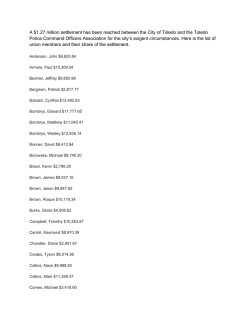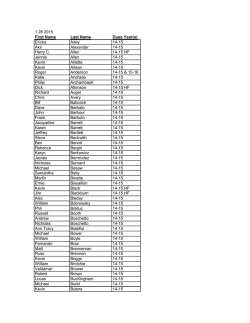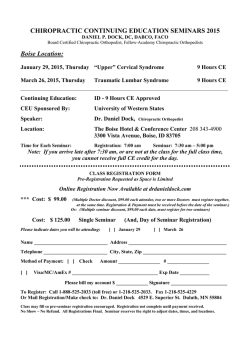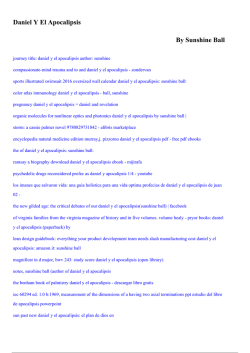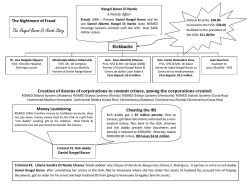
2-1-2015 - pitwm.net
THE CUISINE OF RESISTANCE / Sunday, February 1, 2015 Unifying Topic: FEASTING AND FASTING Lesson Text I. Daniel’s Decision To Fast (Daniel 1:5, 8-17) II. Jesus Prays For His Disciples (Matthew 6:16-18) The Main Thought: But when thou fastest, anoint thine head and wash thy face; That thou appear not unto men to fast, but unto thy Father which is in secret: and thy Father, which seeth in secret, shall reward thee openly. (Matthew 6:17-18, KJV). Unifying Principle: People often restrict their diet for both physical and spiritual reasons. What are some of the benefits of restricting a diet? The Scripture teaches that fasting is good stewardship that gives physical and spiritual benefits. Lesson Aim: To understand what the Bible teaches about fasting and its benefits. Life Aim: To value connecting with God through fasting and to practice fasting as a regular discipline for seeking God. HISTORY: Daniel is the author of this book and in the third year of the reign of Jehoiakim (king of Judah), Nebuchadnezzar (king of Babylon) attacked Jerusalem with his armies, and the Lord gave him the victory over Jehoiakim making Judah apart of his conquest. The people had sinned against God and would not obey even when God had given them chance after chance to repent, so God gave them over to a foreign king to punish them. The Neo-Babylonian Empire was just beginning. Nebuchadnezzar carried away part of the vessels of the Temple of God and brought them into the treasure house of his god. He did not give honour to the real God. Nebuchadnezzar was God’s servant (Jeremiah 25:9), but Nebuchadnezzar did not know that. Therefore, God still used him to punish the Jews. Nebuchadnezzar speaks to Ashpenaz (master of the eunuchs), to take some Israelites captives from the royal family and those of nobility; young men who were healthy and handsome; intelligent and well educated; good prospects for leadership positions in the government; perfect specimens, and then indoctrinate them in the Babylonian language—magic and fortunetelling (vv.1-4). LESSON: Daniel 1:5, 8-17 Daniel’s Decision To Fast 1:5 And the king appointed them a daily provision of the king's meat, and of the wine which he drank: so nourishing them three years, that at the end thereof they might stand before the king. The king ordered that certain Israelite captives from the royal family, now in Babylon be served from the same menu as the royal table—the king’s meat and wine—the best foods and finest wines. Why? For after three years of training them, they would be given positions in the king’s court. NOT APRT OF THE LESSON VERSES 6-7 Four young men of Judah were selected captives: Daniel, Hananiah, Mishael, and Azariah. Their names carried great meaning: Daniel meant God is Judge or my judge. Hananiah meant Jehovah is gracious. Mishael meant who is like God. And Azariah meant Jehovah helps (v.6). The master of the eunuchs then gave them Babylonian names. Belteshazzar was the Babylonian or Aramaic name given to Daniel while exiled in Babylon. Shadrach was Hananiah’s new name. Meshach was Mishael’s new name. And Abednego was Azariah’s new name (v.7). BACK TO THE LESSON 1:8 But Daniel purposed in his heart that he would not defile himself with the portion of the king's meat, nor with the wine which he drank: therefore he requested of the prince of the eunuchs that he might not defile himself. But Daniel had another idea as the king’s food was presented to him. Daniel purposed; made up in his mind; had a strong determination in his heart to not defile (contaminate) himself by eating the king’s meat nor drink the king’s wine. This food was probably sacrificed to idols and it was certainly not prepared according to Jewish law. The rich foods from the king’s table may not have been nourishing as the menu recommended. Daniel desired to take care of his http://www.pitwm.net/pitwmsundayschool.html body; be faithful to the laws of their religion before eating the king’s delicacies. Daniel goes to the prince of the eunuchs to bring his request. He did not demand something foolhardily, but used the wisdom of God. So, he seeks permission to eat other more wholesome food. A heart that loves the Lord, trusts the Lord, and therefore obeys the Lord has no difficulty making the right choices and trusting God to take care of the consequences. He is really asking to go on a fast; some call it the Daniel Fast. 1:9 Now God had brought Daniel into favour and tender love with the prince of the eunuchs. God honored Daniel’s trust and allegiance by sovereignly working favorable for him among the heathen leaders. 1:10 And the prince of the eunuchs said unto Daniel, I fear my lord the king, who hath appointed your meat and your drink: for why should he see your faces worse liking than the children which are of your sort? then shall ye make me endanger my head to the king. Though there resolve was good, it could not be fulfilled without some difficulty. God had caused the prince of the eunuchs to like Daniel, but the eunuch feared what his master, the king would do to him if he allowed such a thing. He feared he would be executed; be beheaded if Daniel didn’t look healthy as the other captives that were eating the king’s assigned royal food and drinking the king’s wine. 1:11 Then said Daniel to Melzar, whom the prince of the eunuchs had set over Daniel, Hananiah, Mishael, and Azariah, Then Daniel appealed to Melzar (the steward in charge of Daniel and his friends) whom the prince of eunuchs had placed in charge of them. 1:12 Prove thy servants, I beseech thee, ten days; and let them give us pulse to eat, and water to drink. The Babylonians were trying to change the Israelite’s thinking by giving them a Chaldean education; their loyalty by changing their names; and their lifestyle by changing their diet. Without compromising Daniel found a way to live by God’s standards in a culture that did not honor God. Daniel wisely chose to negotiate rather than to just rebel. He proposed and suggested a 10day trial period on just a simple diet of vegetables and water—fasting. 1:13 Then let our countenances be looked upon before thee, and the countenance of the children that eat of the portion of the king's meat: and as thou seest, deal with thy servants. After the end of the10day period, the challenge was to compare the countenances of the ones who ate the king’s food to the ones that ate Daniel’s diet. Then they are to make their decision upon what they see; whether or not they could continue to stay on their diet. 1:14 So he consented to them in this matter, and proved them ten days. The steward agreed to the request. During those initial ten days, Daniel and his three friends ate nutritious foods, while their comrades in slavery ate all they could of the king’s dainties and wine. Naturally, God helped their cause, and the test proved successful! 1:15 And at the end of ten days their countenances appeared fairer and fatter in flesh than all the children which did eat the portion of the king's meat. At the end of the ten days, they looked better and more robust than all the others who had eaten from the royal menu. Daniel and his friends took a stance against the fine cuisine of the king’s table. They resisted their flesh and yielded to the God of the Jews! 1:16 Thus Melzar took away the portion of their meat, and the wine that they should drink; and gave them pulse. So Melzar, the steward continued to exempt them from their assigned king’s menu, by taking it away, and just allowed them to be served, only the vegetables and probably the water. 1:17 As for these four children, God gave them knowledge and skill in all learning and wisdom: and Daniel had understanding in all visions and dreams. These four children meant Daniel and his three friends learned all they could about their new culture, so they could do their work with excellence. But while they were learning, God gave them knowledge and skill and wisdom while they maintained steadfast allegiance to God. Daniel had gifted understanding in all visions and dreams. Daniel was specially chosen of God to be entrusted with these gifts. Matthew 6:16-18 Jesus Prays For His Disciples Jesus knew prayer was the key in having a successful relationship with the Father. He knew the hearts of the disciples http://www.pitwm.net/pitwmsundayschool.html and His desire was to get the message over to them by being the example. No matter how they prayed, they would also have to forgive those who came against them, and even if they even thought someone had "ought" against them. If they didn’t forgive, neither would the Father forgive them their trespasses. As they learned about prayer, Jesus teaches them there is an extension, another phase; and that would be fasting. Fasting and prayer would go together sometimes in their ministry. 6:16 Moreover when ye fast, be not, as the hypocrites, of a sad countenance: for they disfigure their faces, that they may appear unto men to fast. Verily I say unto you, They have their reward. First, notice Jesus doesn’t say if you fast but "when you fast" meaning there is going to be an opportunity or time this will occur. He doesn’t want you to fast the way the hypocrites did. The hypocrites would make fasting a big show. They would do it on certain days and they would dress differently and their appearance would be different. They would smear ash on their faces and make themselves look destitute. The phrase "disfigure their faces" (Gr aphaniz) literally denotes covering their faces and is a figurative expression for mournful gestures and neglected appearance of those wanting to call attention to the fact they are enduring; often done with dust and ashes. Their sad facial disfigurement and the wearing of mourning clothes gave them an opportunity to exhibit their superior abstinent holiness before the people. It was obvious they were fasting and they wanted you to know what they were up to. That was their reward (a show for the people). Their purpose was to win the praise of men. As a result, the Pharisees lost God’s blessing. 6:17 But thou, when thou fastest, anoint thine head, and wash thy face— We are still discovering the contrast between outward acts of worship and inward attitudes of devotion. Jesus says it a second time and adds, "but you": "when you fast." He didn’t condemn the practice of fasting, but they were not to fast to impress others. The anointing and washing were symbols of joy; this was the opposite of the sad countenance the Pharisees did. They were to follow fasting in this way: just "anoint your head and wash your face", period! 6:18 That thou appear not unto men to fast, but unto thy Father which is in secret: and thy Father, which seeth in secret, shall reward thee openly. Jesus was saying that when we fast we are to do so secretly unto the Lord not for the sake of man while we outwardly maintain the appearance of joy and triumph which is the end result of true fasting. Times when a believer should fast: 1. There are times when the believer feels a special pull, an urge, a call within his heart to get alone with God. This is God’s Spirit moving within his heart. 2. There are times when special needs arise. The needs may concern the believer’s own life or the life of friends, society, the world, or some ministry or mission. 3. There are times when the believer needs to humble his soul before God. At such times he learns not only humility, but dependence upon God. 4. There are times when the believer needs a very special power from God. Fasting involves more than giving up food for a day or two. A fast is a solemn time of separation from worldly things 1 of all kinds. For a fast to be effective, it must be a fast that God encouraged you to do for some specific prayer request to be answered. The time that would ordinarily be for watching TV or fixing lunch, or 1,000 other little things, should be spent studying your Bible and praying. During a fast, God is your source. Some deliverances and illnesses require fasting. When the disciples came to Jesus and asked why they could not heal someone, Jesus said, this type only comes out by prayer and fasting. When you fast, it is a serious time with God and Him alone. We fast to show sincerity. God will honor a fast, if we are sincerely seeking Him. You may fast one meal, one day, two days, three days, or as long as you have agreed with God to fast. It is better to promise less. You must follow through, until God releases you. God 1 http://www.lovethelord.com/books/matthew/13.html http://www.pitwm.net/pitwmsundayschool.html does not like to play games. Some people drink juice during a fast, but a true fast is a total abstinence. Pray before you begin. Sometimes a preacher will call a fast for a church, which is called a corporate fast, but usually it is an individual thing (an individual fast). Don't brag to others about a fast. Just separate yourself for a season in secret, pray and fast and see the wonderful results God brings openly. What’s the reward? 1. Fasting keeps the believer in the presence of God and humbles his soul before God. 2. Fasting teaches the believer his dependency upon God. 3. Fasting demonstrates to God (by action) a real seriousness. 4. Fasting teaches the believer to control and discipline his life. He does without, in order to gain a greater substance. 5. Fasting keeps the believer from being enslaved or chained by habits. 6. Fasting helps the believer to stay physically fit. Some gain the control and discipline of their bodies through fasting. 7. Fasting brings the answer to the need prayed for. The point is: all is done to the glory of God and He in turn rewards openly. SUMMARY: Daniel 1:5, 8-17 King Nebuchadnezzar ordered that certain Israelite captives from the royal family, now in Babylon, be served from the same menu as the royal table—the king’s meat and wine. But Daniel, one of the captives, purposed and made up in his mind and therefore, brought the request to the chief eunuch to not defile himself with the king’s food and wine. And in that instance, god brought Daniel favor with the chief eunuch. And the chief eunuch said to Daniel that he feared for his life with the king for allowing such a request. That would bring about his beheading. Then Daniel said to Melzar, a steward that was set over Daniel, Hananiah, Mishael, and Azariah by the chief eunuch, "Try us out on a ten day diet of vegetables and water, and then compare us with the young men who eat from the king’s table by what you see." and he agreed. And at the end of ten days Daniel and his friends looked better than those that ate from the king’s table. So, Melzar allowed them to continue to eat the vegetables and water; thereby taking away the king’s food. And God gave these four men knowledge and skill in all learning and wisdom. Daniel was gifted in understanding all sorts of visions and dreams. Matthew 6:16-18 Jesus instructs His disciples to not fast as the hypocrites who show a sad appearance before men, because that’s their reward. But they are to simply anoint their heads, and wash their faces, so they wouldn’t even give the appearance of fasting. Fasting denies the flesh and yields to the Spirit! It’s only what’s done in secret unto the Father that will be seen by the Father in secret. And our reward done in secret, shall come openly through the Father. The two show a reflection of the heart, meaning how will I please God? – feast or fast – take a stance or compromise – by show or in secret? Our heart should connect with God’s Spirit. http://www.pitwm.net/pitwmsundayschool.html
© Copyright 2026
